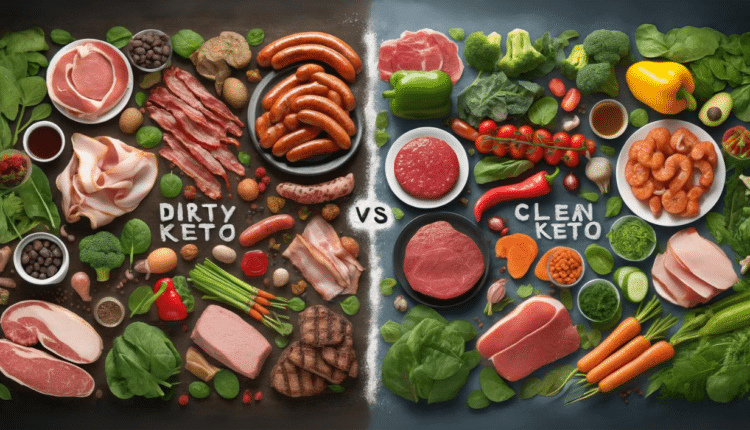Ketogenic diets are well-known for their various health benefits, but crucial details are overlooked–the dichotomy between clean keto and its counterpart, dirty keto.
In this comprehensive exploration, we unravel the intricacies of Clean Keto and illuminate its transformative potential for health and well-being.
Understanding Clean Keto
Keto diets prioritize high fats, minimal carbs, and moderate protein. Both a clean and dirty keto diet help with weight loss, but the difference between the two is astronomical.
Clean keto embodies a dietary philosophy rooted in consuming wholesome, nutrient-dense foods. Dr. Eric Berg covers the keto diet masterfully on his YouTube channel. He often refers to a clean keto diet as a “healthy keto diet.”
At clean keto’s core lies a profound commitment to quality and purity.
Why Clean Keto Matters
The significance of Clean Keto extends far beyond its ability to induce ketosis. By prioritizing nutrient-dense, unprocessed foods, Clean Keto offers a holistic approach to health optimization. It safeguards against inflammation, supports metabolic efficiency, and fosters sustainable weight management.
Essential Foods of Clean Keto
Limiting processed foods and food additives is critical to maintaining a clean keto diet.
High-Quality Fats
High-quality fats include avocados, coconut oil, extra-virgin olive oil, butter or ghee from grass-fed cows, and raw nuts or seeds.
Lean Proteins
Lean proteins include organic grass-fed beef, organic pasture-raised poultry and eggs, and wild-caught fish.
We do not recommend consuming factory-farmed animals due to factories loading animals with antibiotics and hormones. The large amounts of hormones, such as cortisol, from the animals’ stressful living conditions raise inflammation in your body.
Furthermore, most factories feed grains to their animals, resulting in high levels of Omega 6 fatty acids. The high levels can cause an imbalance between your Omega 3 and Omega 6.
While organic food has a reputation for being expensive, there are methods to lower the costs. Places such as Costco offer organic options at a fraction of the price of their competitors, such as Whole Foods, Sprouts, or Trader Joe’s.
Low-Carb Vegetables
Clean keto diets also emphasize an abundance of low-carb vegetables, such as leafy greens, broccoli, cauliflower, zucchini, and other non-starchy vegetables.
We recommend eating 5 cups or more daily to maintain nutrient balance, prevent deficiencies, and raise antioxidant levels.
Dirty Keto vs Clean Keto
While clean keto focuses on the quality of the food, dirty keto will tend to focus merely on macronutrients such as protein, carb, or fat.
Some follow a keto diet by eating a McDonald’s burger without the bun. Other additions may include junk food like pork rinds, processed cheeses, jerky, sausages, and other packaged foods high in bad fats, additives, and preservatives. Dirty keto refuses to distinguish grass-fed vs grain-fed animals and does not emphasize non-starchy vegetables.
Dirty keto throws many different types of protein into the same category. It regards highly processed proteins like sausage, salami, and other deli meats loaded with nitrites as perfectly fine to eat simply because of their zero net carbs.
With dirty keto, the focus is convenience, not health.
Navigating the Pitfalls of Dirty Keto
In stark contrast to Clean Keto, Dirty Keto eschews food quality in favor of convenience and simplicity. It disregards the source and purity of ingredients, prioritizing macronutrient ratios over nutritional integrity. While Dirty Keto may yield short-term weight loss results, its long-term health implications are cause for concern.
Drawbacks of Dirty Keto
Unlike clean keto diets, dirty keto has many drawbacks.
Nutrient Deficiencies
Regularly consuming processed foods and neglecting various whole foods leads to essential vitamin and mineral deficiencies. Furthermore, processed foods deplete nutrients in the body, making it challenging to recover from illnesses.
Poor Gut Health
A lack of dietary fiber, including prebiotics typically found in whole vegetables and fruits, leads to gut dysbiosis or an imbalance in gut flora.
Risk of Chronic Diseases
The dirty keto diet increases the risk of heart disease. Constantly consuming processed foods leads to higher intakes of toxic fats, like trans fats and seed oils. Furthermore, additives are known to increase the risk of heart disease, diabetes, cancer, and other chronic conditions.
Dirty Keto exposes you to antibiotics, hormones, chemicals, and preservatives setting the stage for neurodegenerative diseases.
Energy and Mood Fluctuation
A dirty keto diet, high in processed foods, exposes you to large amounts of chemicals like artificial sweeteners, MSGs, and other flavor enhancers and preservatives.
Chronic exposure to these chemicals disrupts brain neurotransmitters and mitochondrial function, leading to depressive disorders, anxiety, and low energy.
The Road Ahead: Embracing Clean Keto
As you embark on your ketogenic journey, remember that every food choice is an opportunity to nourish and heal your body. Clean keto empowers you to reclaim control of your health, one wholesome meal at a time.
Whether seeking weight loss, enhanced energy levels, or improved overall well-being, Clean Keto offers a path grounded in science, sustainability, and self-care.
Struggling with Neuropathy?
Dr. Coppola and Dr. Monteiro’s dedication to combating neuropathy is deeply personal, stemming from Dr. Monteiro’s experience with her mother’s severe chemo-induced neuropathy. This personal journey fueled their commitment to develop a systematic, drug-free approach to reversing neuropathy.
They founded the San Antonio Neuropathy Center, where they’ve successfully treated over 18,000 patients over the past two decades. Their acclaimed book, “Defeat Neuropathy Now in Spite of Your Doctor,” along with their neuropathy product line, stands as a testament to their expertise and innovative solutions.
Recognized as leading neuropathy specialists in America, Dr. Coppola and Dr. Monteiro offer a beacon of hope for those diagnosed with this challenging condition. If you or a loved one is seeking relief from neuropathy, reach out to us at 844 400-0101 or email us through our contact page – Click here.
Your path to healing can start today.


Comments are closed, but trackbacks and pingbacks are open.